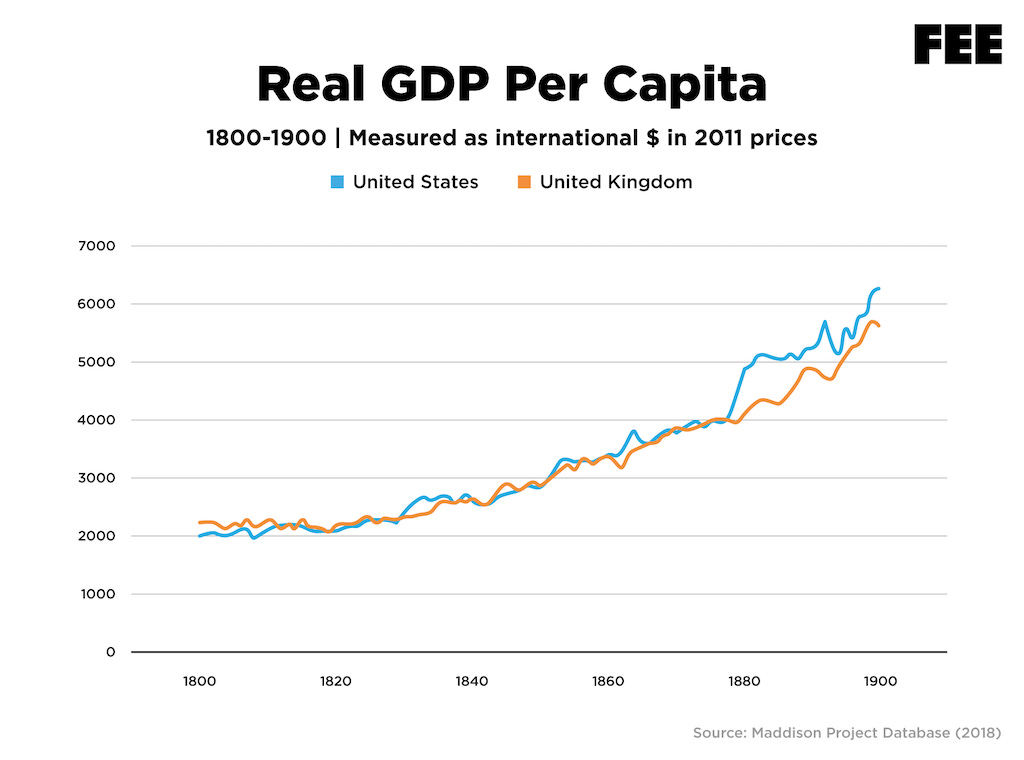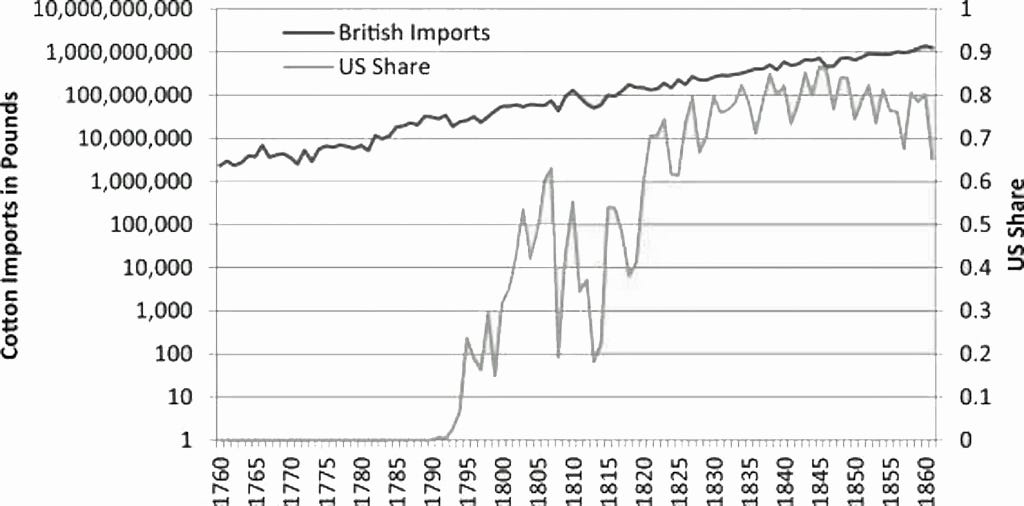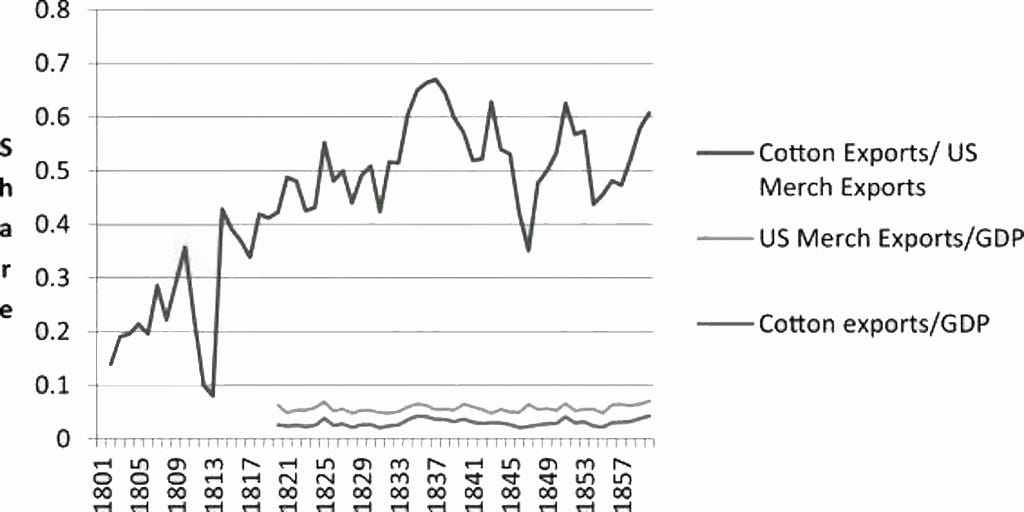No, Slavery Did Not Make America Rich
In fact, slavery actually retarded economic growth.
by Corey Iacono
September 10, 2022
In 1847, Karl Marx wrote that:
"Without slavery, you have no cotton; without cotton, you have no modern industry…cause slavery to disappear and you will have wiped America off the map of nations."
As with most of his postulations concerning economics, Marx was proven wrong.
Following the Civil War and the abolition of slavery in 1865, historical data show there was a recession, but after that, post-war economic growth rates rivaled or surpassed the pre-war growth rates, and America continued on its path to becoming the number one political and economic superpower, ultimately superseding Great Britain (see Appendix Figure 1).
The historical record of the post-war economy, one would think, obviously demonstrated slavery was neither a central driving force of, or economically necessary for, American economic dominance, as Marx thought it was. And yet, somehow, even with the benefit of hindsight, there are many academics and media pundits still echoing Marx today.
For instance, in his essay published by The New York Times’ 1619 Project, Princeton sociologist Matthew Desmond claims the institution of slavery “helped turn a poor, fledgling nation into a financial colossus.”
“The industrial revolution was based on cotton, produced primarily in the slave labor camps of the United States,” Noam Chomsky similarly stated in an interview with the Times. Both claims give the impression that slavery was essential for industrialization and/or American economic hegemony, which is false.
Slavery Was Neither Crucial nor Necessary for the Industrial Revolution
The Industrial Revolution paved the way for modern economic development and is widely regarded to have occurred between 1760 and 1830, starting in Great Britain and subsequently spreading to Europe and the US.
As depicted in Figure 1., raw cotton produced by African-American slaves did not become a significant import in the British economy until 1800, decades after the Industrial Revolution had already begun.
Although the British later imported large quantities of American cotton, economic historians Alan L. Olmstead and Paul W. Rhode note that “the American South was a late-comer to world cotton markets,” and “US cotton played no role in kick-starting the Industrial Revolution.”
Nor was the revolution sparked by Britain’s involvement with slavery more broadly, as David Eltis and Stanley L. Engerman assessed that the contribution of British 18th-century slave systems to industrial growth was “not particularly large.”
There is also the theory that the cotton industry, dependent on slavery, triggered industrialization in the northern United States by facilitating the growth of textile industries. But as demonstrated by Kenneth L. Sokoloff, the Northern manufacturing sector was incredibly dynamic, and productivity growth was broad-based and in no way exclusive to cotton textiles.
Eric Holt has further elaborated, pointing out that
the vast literature on the industrial revolution that economic historians have produced shows that it originated in the creation and adoption of a wide range of technologies, such as the steam engine and coke blast furnace, which were not directly connected to textile trading networks.
Cotton Exports Didn't Make the United States an Economic Superpower
In contrast, P.R. Lockhart of the leftwing publication Vox makes the following argument:
The bodies of the enslaved served as America’s largest financial asset, and they were forced to maintain America’s most exported commodity… the profits from cotton propelled the US into a position as one of the leading economies in the world and made the South its most prosperous region.
But while slavery was an important part of the antebellum economy, claims about its central role in the Industrial Revolution and in America’s rise to power via export-led growth are greatly exaggerated.
Olmstead and Rhode have observed that although cotton exports comprised a tremendous share of total exports prior to the Civil War, they accounted for only around 5 percent of the nation’s overall gross domestic product, an important contribution but not the backbone of American economic development (see Figure 2).
Slavery Delayed Southern Industrialization
One can certainly argue that slavery made the slaveholders and those connected to the cotton trade extremely wealthy in the short run, but the long-run impact of slavery on overall American economic development, particularly in the South, is undeniably and unequivocally negative.
As David Meyer of Brown University explains, in the pre-war South, “investments were heavily concentrated in slaves,” resulting in the failure “to build a deep and broad industrial infrastructure,” such as railroads, public education, and a centralized financial system.
Economic historians have repeatedly emphasized that slavery delayed Southern industrialization, giving the North a tremendous advantage in the Civil War.
More Slavery Means Less Prosperity, Even over 100 Years Later
Harvard economist Nathan Nunn has shown that across the Americas, the more dependent on slavery a nation was in 1750, the poorer it was in 2000 (see Figure 3.).

He found the same relationship in the US. In 2000, states with more slaves in 1860 were poorer than states with fewer slaves and much poorer than the free Northern states (see Figure 4.)

According to Nunn,
looking either across countries within the Americas or across states and counties within the U.S., one finds a strong significant negative relationship between past slave use and current income.
Slavery was an important part of the American economy for some time, but the reality is that it was completely unnecessary and stunted economic development, and it made Americans poorer even over 150 years later.
The historical and empirical evidence is in accordance with the conclusion of Olmstead and Rhode—that slavery was
a national tragedy that…inhibited economic growth over the long run and created social and racial divisions that still haunt the nation.
— No, Slavery Did Not Make America Rich originally appeared at FEE.org.






Well written and interesting! Personally, I'd say our biggest driver of growth and innovation was the variability and moderate redundancy generated by our federalist system, a system that was federalist not only in the political sphere but in the economic and scientific spheres as well. And we had very unique features in these regards as well, take banking and finance, we had truly decentralized system of systems, this gave us all the benefits of a large continental fully integrated capital market WHILE also providing the benefits of local nd regional capital flow inhibitors and biases. At least in regards to economic policy, the country was genius in its design.
If cotton was so essential to the US economy, why was the Morrill Tariff of 1861 enacted?
Southern planters opposed the tariff yet it became law.